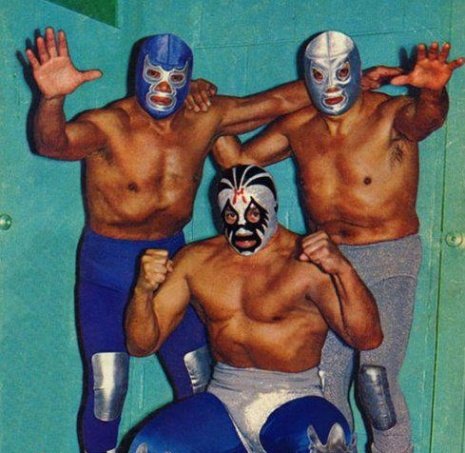Lucharaaaaaaan! We are now in the fourth episode of ¡Mucha Lucha! thanks to our Summer TV Binge, today we are reviewing “The Fantastic Backpack” and “The Naked and the Masked”. And as every week here’s a song for you, this one is subtly featured on the second part: Café Quijano’s Desde Brasil. And now that the ring is ready, let’s start this review:
1. Recaps
Rikochet is being pursued by some unmasked bullies, but thanks to “The Fantastic Backpack” he’s out of danger. But the Brutos don’t deserve to die trapped in a backpack so los Mascaritas have to save them from that wasteland Rikochet calls a backpack.
In “The Naked and the Masked” our hero loses his mask. Dang! He’s going to get in trouble if he doesn’t get it back in time.
2. Masked versus Unmasked
In the first part los Brutos are introduced, which will be featured in a lot of following episodes, and it was interesting to me to see the differences between characters. Our heroes are masked and their skin is brunette, or as we call it, aperlada. On the other side, the bad guys don’t wear a mask, but not just that. They look American: a white emo-type boy, another white ‘rednecky’ boy and a black girl.
This is interesting in two ways: it reflects how wrestling is different in each country. Ours is very influenced by our culture and our traditions, very focused on giving a show, a spectacle. Meanwhile American wrestling is more focused on the athletic side, showing more their capacity, and not so much the show (although, it is spectacular in itself).
The other way? The cultural way. For a long time, Mexicans have been kind of resentful of Americans, sometimes seen as villains, and I love you, USA, but I’m sorry to say you can’t blame us. I’m trying to avoid politics but right now your president seems to hate us, and it only throws gasoline to the fire. It’s weird, but this simple, innocent cartoon reflects a lot of what the society sees.
Do you want proof of how fitting this rivalry is? Here in México, an American wrestler is using Trump in the ring, and that’s the reason he is becoming famous: he’s the perfect villain to be hated. If you want to read more about this, The Washington Post and the Denver Post have you covered.
3. “… you really need the mask”
The second part of the episode is all about the importance of having a mask. It reflects your past, your family and who you are. I will not talk about the real-life history and value of masks on Mexican wrestling, but I can tell you that all of our classic heroes have one. Weirdly enough, masks are not for hiding who you are. On the contrary, masks tell us who the fighter is, what he stands for, and what he believes in. Yes, that much!

4. Animation
I have been noticing this since I started reviewing the series, but this time, on “The Fantastic Backpack,” I noticed particularly. I’m talking about the tackyness of the animation. I mean, it’s a simple style, it doesn’t need to be very datailed, but I can’t stop noticing it. It is because ¡Mucha Lucha! is one of the very first cartoons to be animated with Macromedia Flash (now called Adobe Animate). I guess it has a lot of perks: faster production, easier dynamics and movements, etc. But I guess I notice its amateur-ish feeling.
It’s not that it’s bad, I liked it then and I like it now, but it’s interesting to notice that even amateur animated projects on Youtube right now look better, It’s always interesting to see how the technology (and animation) becomes better every year.
5. Dubbing
I have to be honest, I’m not liking a lot the character of The Flea, but when I was younger it was absolutely hilarious, so, that got me thinking, maybe the Spanish dubbing has a lot to do with my enjoyment of a character. Usually I prefer to see all I watch in its original language, but there are some things that improve with Spanish dubbing (for example The Simpsons and Malcolm In The Middle). Included in that list is this show, mainly because of The Flea, who is given an accent very particular to a region of the country, and that makes it way funnier. I guess you will have to be the judge: here’s a snippet from an upcoming episode.
Well, this was a packed review! Fortunately that’s it for today. Let us know what you think of this episode of ¡Mucha Lucha! (and any other series from our Summer TV Binge) in the comments below. See you next Friday!






